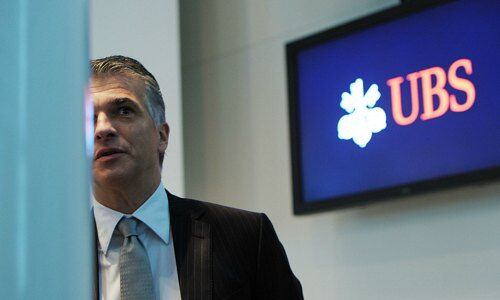For Sergio Ermotti, UBS' Boredom Finally Pays
«Fluctuat nec mergitur»: the Swiss supertanker is battered by the pandemic's waves, but never capsized. CEO Sergio Ermotti illustrates that boredom pays as he hands over a rock-solid firm to successor Ralph Hamers.
The sharply different investor responses to first-half results from Switzerland's largest wealth managers say it all: Julius Baer's stock slid on Monday despite record profits, while UBS' unspectacular result on Tuesday bolstered shares to a five-month high.
The $2.6 trillion wealth supertanker's performance thus far in the coronavirus pandemic – and how investors applaud it – as a massive vindication for CEO Sergio Ermotti, who hands over to his successor, ex-ING boss Ralph Hamers, in three months. Ermotti's famous aversion to risk is finally paying off.
Taking A Beating
Despite a five percent fall in UBS' shares so far this year, the Swiss bank is among the most solid banking stocks in Europe. Its credit default spreads, an indicator of how likely investors believe the company is to default, are among the lowest in UBS' peer group, and showed little movement during the market ructions of March and April.
Ermotti weathered considerable criticism as stock markets boomed in recent years – and UBS' shares foundered. UBS is paying a «boredom premium» under Ermotti, a Swiss banker who never made a secret of his aversion to risk-taking for short-term profits.
Little Focus on Products
The difference is vividly illustrated by Julius Baer: the wealth manager fed clients structured products and also enticed them into buying and selling securities, while UBS was far more reserved. Except in Asia, where clients are generally more tolerant of big risks than elsewhere, UBS' transaction-based revenue didn't move much from April to June.
Instead, UBS' focus on wealth management is squarely on winning more discretionary and advisory mandates than on selling products. Clients paid it back, entrusting $27 billion to UBS' bankers in the first six months ($9 billion of it in the second quarter).
Strong Capital Base
Against UBS' $2.6 trillion in overall assets, this represents modest growth of just more than one percent. Nevertheless, it illustrates that UBS could still pull money in when the pandemic put the kibosh on meeting prospective clients in-person (its «UBS Welcome» app deserves particular mention here).
The fresh money UBS' private bankers are hauling in right now is a major credit to Ermotti's leadership: Switzerland's largest bank expanded its sturdiest form of capital to 13.3 percent and its liquidity coverage ratio to 155 percent in the second quarter.
Seeking Closer Ties
Both underscore Ermotti's discipline in managing UBS' risk. Investors expect his successor, Ralph Hamers, who joins in six weeks, to soften the bank's dominant, inflexible hierarchies and make UBS more nimble and responsive to challengers – a goal wealth co-boss Iqbal Khan is also pursuing.
Khan doesn't intend to stuff UBS client portfolios with more risky investments; very simplistically, he wants to deliver services from the wealth management, asset management, or investment banking unit to its wealthy clients faster and more easily.
Breaking, Rattling, Challenging
Initial fruits of these efforts are visible in UBS' global family office, a unit for the super-rich run by veteran Josef «Joe« Stadler. The recently pared-backed operation hiked revenue by 22 percent, including a $34 million contribution from the investment banking arm.
While modest, the showing is evidence that UBS still has the freedom to maneuver within Ermotti's risk limits, when people like Khan and his co-head Tom Naratil begin challenging its hidebound culture. If Hamers maintains the risk aversion and pairs it with his own proven skill at shaking up organizations and alliances, boredom plus agility could become the Swiss bank's new motto.



























